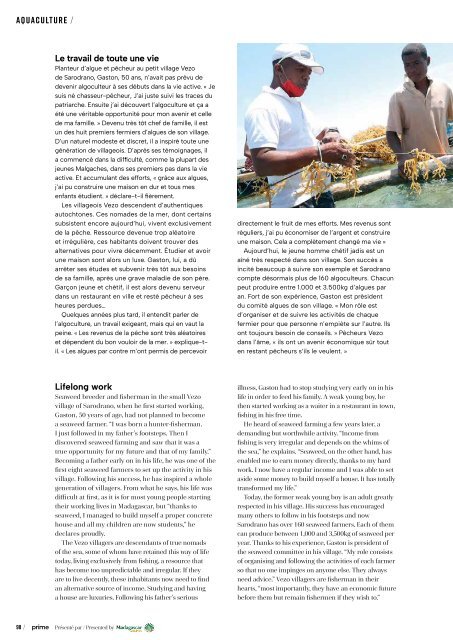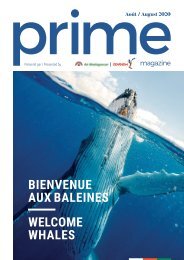Prime Magazine September 2023
You also want an ePaper? Increase the reach of your titles
YUMPU automatically turns print PDFs into web optimized ePapers that Google loves.
AQUACULTURE /<br />
Le travail de toute une vie<br />
Planteur d’algue et pêcheur au petit village Vezo<br />
de Sarodrano, Gaston, 50 ans, n’avait pas prévu de<br />
devenir algoculteur à ses débuts dans la vie active. « Je<br />
suis né chasseur-pêcheur, J’ai juste suivi les traces du<br />
patriarche. Ensuite j’ai découvert l’algoculture et ça a<br />
été une véritable opportunité pour mon avenir et celle<br />
de ma famille. » Devenu très tôt chef de famille, il est<br />
un des huit premiers fermiers d’algues de son village.<br />
D’un naturel modeste et discret, il a inspiré toute une<br />
génération de villageois. D’après ses témoignages, il<br />
a commencé dans la difficulté, comme la plupart des<br />
jeunes Malgaches, dans ses premiers pas dans la vie<br />
active. Et accumulant des efforts, « grâce aux algues,<br />
j’ai pu construire une maison en dur et tous mes<br />
enfants étudient. » déclare-t-il fièrement.<br />
Les villageois Vezo descendent d’authentiques<br />
autochtones. Ces nomades de la mer, dont certains<br />
subsistent encore aujourd’hui, vivent exclusivement<br />
de la pêche. Ressource devenue trop aléatoire<br />
et irrégulière, ces habitants doivent trouver des<br />
alternatives pour vivre décemment. Étudier et avoir<br />
une maison sont alors un luxe. Gaston, lui, a dû<br />
arrêter ses études et subvenir très tôt aux besoins<br />
de sa famille, après une grave maladie de son père.<br />
Garçon jeune et chétif, il est alors devenu serveur<br />
dans un restaurant en ville et resté pêcheur à ses<br />
heures perdues…<br />
Quelques années plus tard, il entendit parler de<br />
l’algoculture, un travail exigeant, mais qui en vaut la<br />
peine. « Les revenus de la pêche sont très aléatoires<br />
et dépendent du bon vouloir de la mer. » explique-til.<br />
« Les algues par contre m’ont permis de percevoir<br />
directement le fruit de mes efforts. Mes revenus sont<br />
réguliers, j’ai pu économiser de l’argent et construire<br />
une maison. Cela a complètement changé ma vie »<br />
Aujourd’hui, le jeune homme chétif jadis est un<br />
aîné très respecté dans son village. Son succès a<br />
incité beaucoup à suivre son exemple et Sarodrano<br />
compte désormais plus de 160 algoculteurs. Chacun<br />
peut produire entre 1.000 et 3.500kg d’algues par<br />
an. Fort de son expérience, Gaston est président<br />
du comité algues de son village. « Mon rôle est<br />
d’organiser et de suivre les activités de chaque<br />
fermier pour que personne n’empiète sur l’autre. Ils<br />
ont toujours besoin de conseils. » Pêcheurs Vezo<br />
dans l’âme, « ils ont un avenir économique sûr tout<br />
en restant pêcheurs s’ils le veulent. »<br />
Lifelong work<br />
Seaweed breeder and fisherman in the small Vezo<br />
village of Sarodrano, when he first started working,<br />
Gaston, 50 years of age, had not planned to become<br />
a seaweed farmer. “I was born a hunter-fisherman.<br />
I just followed in my father’s footsteps. Then I<br />
discovered seaweed farming and saw that it was a<br />
true opportunity for my future and that of my family.”<br />
Becoming a father early on in his life, he was one of the<br />
first eight seaweed farmers to set up the activity in his<br />
village. Following his success, he has inspired a whole<br />
generation of villagers. From what he says, his life was<br />
difficult at first, as it is for most young people starting<br />
their working lives in Madagascar, but “thanks to<br />
seaweed, I managed to build myself a proper concrete<br />
house and all my children are now students,” he<br />
declares proudly.<br />
The Vezo villagers are descendants of true nomads<br />
of the sea, some of whom have retained this way of life<br />
today, living exclusively from fishing, a resource that<br />
has become too unpredictable and irregular. If they<br />
are to live decently, these inhabitants now need to find<br />
an alternative source of income. Studying and having<br />
a house are luxuries. Following his father’s serious<br />
illness, Gaston had to stop studying very early on in his<br />
life in order to feed his family. A weak young boy, he<br />
then started working as a waiter in a restaurant in town,<br />
fishing in his free time.<br />
He heard of seaweed farming a few years later, a<br />
demanding but worthwhile activity. “Income from<br />
fishing is very irregular and depends on the whims of<br />
the sea,” he explains. “Seaweed, on the other hand, has<br />
enabled me to earn money directly, thanks to my hard<br />
work. I now have a regular income and I was able to set<br />
aside some money to build myself a house. It has totally<br />
transformed my life.”<br />
Today, the former weak young boy is an adult greatly<br />
respected in his village. His success has encouraged<br />
many others to follow in his footsteps and now<br />
Sarodrano has over 160 seaweed farmers. Each of them<br />
can produce between 1,000 and 3,500kg of seaweed per<br />
year. Thanks to his experience, Gaston is president of<br />
the seaweed committee in his village. “My role consists<br />
of organising and following the activities of each farmer<br />
so that no one impinges on anyone else. They always<br />
need advice.” Vezo villagers are fisherman in their<br />
hearts, “most importantly, they have an economic future<br />
before them but remain fishermen if they wish to.”<br />
98 / prime<br />
Présenté par / Presented by
















